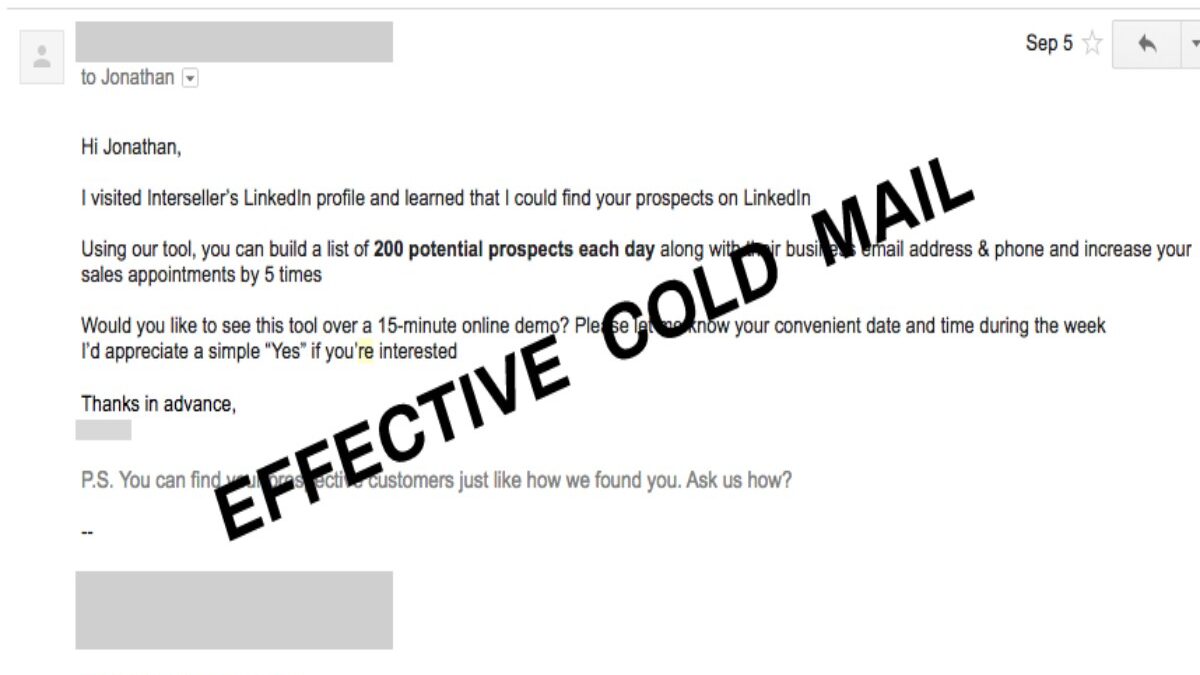Table of Contents
ToggleWhat Is A Cold Email?
Effective Cold Mail: Cold emailing is a sales technique that involves the use of an email to initiate a conversation with a person. This conversation is initiated not necessarily for purpose of getting the user to do anything on your website or buy your product but to build a potential business relationship with them. While a lot of people believe that cold email is synonymous with spam email on the contrary if done right, cold emails can be proven to yield successful results numerous times.
A cold email can be difficult to compose as it requires a strong strategy that is geared toward achieving a goal. An organisation can make it convenient for them by hiring an experienced content writer who would be better at completing this task.
There must be something wrong with the way your cold emails are drafted if they are not yielding results. The biggest mistake people make while writing a cold email is that their entire email is focused on the product or service. Whereas, the cold email should be tailored based on the nature of the recipient. The best way to achieve this is by empathising with the prospect.
The key to retaining prospects is to make them feel as though they are a part of your business. Personalizing the content of the cold email based on the needs of the prospect plays an important role in its success. By building different follow-ups and determining a clear call to action that pings each individual prospect’s response, you can tailor the content to meet their specific needs.
Even though personalization plays a crucial role in the success of a cold email, not everything relies on personalization. Adhering to certain other “ground rules” also allows one to write an effective cold email. These guidelines not only support you in achieving great results but also focus on your goals. Below listed are certain practices that one should keep in mind while writing a cold email that will allow your company to accomplish and grab higher opportunities.
7 Best Practices To Write Effective Cold Mail
Effective Cold Mail: It is imperative that we adhere to a few principles when crafting a successful cold email copy. Your prospecting strategy will yield better results if these practices are followed, which will improve engagement rates and ultimately lead to higher conversion rates.
The key aim of a cold mail is to build a relationship with the recipient. Since they have no or little knowledge about your business and offerings, the cold mail should focus on them and not you. Creating content that not only meets the needs of the prospect but also in a way fulfils the requirement of imposing a call to action is certainly a good approach to follow.
The first step toward writing an effective cold email is to understand the prospect. Put yourself in their shoes, and think through their point of view. Once the prospect finishes reading the email, he or she should feel that your organisation has understood their needs. Understanding their main challenges is critical.
Once you have understood the exact pain of your prospect, you need to figure out a way that would allow your product or service to help them solve their problem. The solution should be clear and concise which will allow them to realise how their issue is being resolved through your organisation. Replies from prospects are a good way of measuring the effectiveness of your cold emails. They work as feedback allowing you to further improve.
1. Ace the subject line
The subject line of the cold email has greater importance in an email than it does in a text. In an email, the subject line is the key element. It should tell the reader why they should be further reading the email. The first thing that a reader notices are the subject line in their mailbox. If you are unable to grab their attention through the subject line, there is a high possibility of them not opening the cold mail.
An excellent subject line is one that describes your subject well enough to make it obvious to the reader what the subject is about. Make the subject line concise and catchy with the type of content and what you hope to get from your audience. This can be done by making the subject line short and simple.
Adding a pinch of personalized content will increase your chances of the reader opening the mail. You can make the subject line personal by adding their name, birthdate, location, hobbies, or interests, this will catch their attention. A poor subject line would result in the prospect not even noticing your cold mail.
2. Keep it short and simple
It’s important to send emails that are relevant and interesting – and we can all agree that a short email will always win the day. This is tricky so look sideways when paying attention. According to research conducted by NYU and MIT professors, shorter emails are more likely to grab attention and receive responses. Therefore the key to leading the prospect to click on your cold mail is to keep the cold mail concise.
The best way to get your message across is to send a short, concise email. Sending a longer, more comprehensive email will cause the recipient to read, but it will have a much lower chance of closing the sale. Cold email is similar to an elevator pitch. You have only a few seconds to impress the reader through your offerings.
3. Have a strong and clever introduction
You can not have an introduction longer than 2-3 sentences. Nowadays people are too busy to read long emails. You barely have eight to ten seconds to grab their attention and a good introduction will surely do so.
Personalize the opening sentences in a way that impresses the reader. Don’t go too far by talking about all of their recent activities. Keep it professional and do not include too much personal information. A good introduction will let the reader know that you have done your homework.
4. Present a specific solution to their problem
Once you have grabbed their attention, it is time to let them know why you are reaching out to them. No matter how good your organisation is, a recipient would not care about it unless you tell them about their benefit.
After a good introduction, you move on to talking about why you reached out to them. Present your product or service in a way that tells them how it will add value to their life. You should also focus on how they will benefit from maintaining a long-term business relationship with your organisation.
5. Validate yourself
Talking about your organisation in the cold email is as vital as talking about the prospect. Remember that since you have done enough research about the reader you know who they are but they have no knowledge about your product or organisation. Establishing credibility and trust is crucial.
If you have any connection with the reader mention it. A common connection avoids the feeling of awkwardness. You are no longer a stranger to them. Whenever possible, mention any reference, credibility, or social standing you have that are relevant to this person and your request. The main aim is to make your organisation turn from a “stranger” to “known” in the eyes of the reader.
6. Conclude with a call to action
Adding a call to action in your cold email is the last step. Include a call to action that will motivate the reader to do what you wanted them to do through this cold email. Scheduling a zoom or skype meeting, subscribing to your offer, or signing up for your free trial, could be anything that you ultimately wanted them to do.
Ensure that the call to action that you include matches the objective of your cold email. Keep it short and to the point. A call to action should not be longer than a sentence and it should be clear. Ensure to not ask for too much otherwise, it might eventually end up the reader losing their interest.
7. Include a signature
Including the signature in a message is a necessary step that can not be ignored. Ideally, it should provide information about us and/or our company, as well as where they can find out more about us or how they can contact us.
Final Word
Effective Cold Mail: A good signature will also help the reader know how to reply to you or contact you apart from the cold email. This will be very useful for future references or contacts. Signature makes the cold email more organised making it readable for the prospect.
Author Bio
Hetvi works as a Product Associate at Refrens.com – Online Invoice Generator & India’s most powerful platform for freelancer’s growth. She has worked for some renowned companies as a Brand and Digital marketing associate. You can follow Refrens.com on Twitter, LinkedIn, and Instagram.
Related posts
Hot Topics
What is Kafka Used For: A Complete Guide
What is Kafka used for? If you’ve been diving into the world of distributed systems, microservices, or data streaming, you’ve…
How Do Password Managers Work? The Guide That Finally Makes Sense
Ever wonder how do password managers work and whether they’re actually safe? I get it. The idea of putting all…



